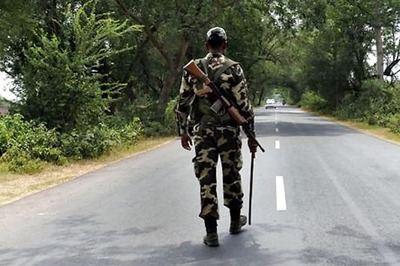
views
New Delhi: On Wednesday, AAP spokesperson Richa Pandey Misra addressed a crowd of young college goers at Delhi’s North Campus, informing them of the dangers of stalking. She has been at the forefront of a campaign in favour of making stalking a non-bailable offence.
“It all starts at stalking,” said the AAP MLA, who has been campaigning for the anti-stalking bill. “More than 80 percent of crimes against women consist of stalking in some form,” she added.
The Delhi Assembly recently passed a resolution seeking amendments to existing laws to make stalking a non-bailable offence
Currently, Section 354 of the IPC deals with offences to the modesty of a woman. It mentions stalking as an offence punishable by up to three years in prison. It was incorporated as part of the law as a result of Criminal Law Amendment Act 2013.
In 2015, at least 6,266 cases of stalking were reported. The number was over 7,000 in 2016.
According to data released by the National Crime Records Bureau, about 80 percent of those arrested under Section 354 D get bail before the filing of the charge sheet.
The resolution asks for three main changes to Section 354:
‘STALKING A CRIME’
First, it wants to make the definition of ‘stalking’ clearer.
“Stalking does not exist as a crime in the minds of most people. If you tell your parents that a boy is following you, they may ask you to not step out or to ‘mend your ways’. Most cops don’t take stalking charges seriously,” said Rekha (name changed), an acid attack survivor, to News18.
She had been attacked in 2004 by a boy who lived in her neighbourhood.
“He would follow me, keep track of my movements. It’s not like how they portray it in movies, it was no one-sided love affair. It was mentally harassing and a potential physical threat. Nobody paid attention to it because stalking is no crime. The result was the acid attack,” said Rekha, who works as an acid attack activist and make-up artist.
Another case that comes to mind is that of aspiring air hostess Riya Gautam, who was stalked and harassed for four months in 2017 before being murdered by her stalker.
“Making stalking a non-bailable offence will give teeth to Section 354 D. It will further help if there was an inventory of sex offenders,” feels AAP MLA Saurabh Bhardwaj, who moved the resolution in March.
‘NOT JUST WOMEN’
Second, the Delhi government wants to make the bill gender neutral.
“Currently, such conversations about harassment and stalking always consider women to be the victims. But what about men who face such problems? What about transgender persons? How can we deny them legal recourse against possible harassment? One of our demands is to make the Anti-stalking Bill gender neutral,” said AAP’s Richa Pandey Misra.
‘NO LAWS AGAINST CYBERSTALKING’
Third, the bill aims at including online stalking as part of the law.
“I was stalked for almost 9 months from January to September 2009 on social media by this man who kept creating creepy new profiles to ‘add’ me on Facebook despite my blocking each one of them,” says Dyuti Sudipta, a researcher working in Delhi.
“He would assume a character from latest films and pop trends with every profile. He would comment on every photo or post I made. When I would block him, he would harass my other Facebook friends for information about me. After a point, I deactivated my account. This person went to the lengths of procuring my address and number,” Dyuti recounts.
There are no specific laws to convict cyber-stalkers. Surprisingly, men are equally at the receiving end of the crime. A 2015 report in Times of India claimed that almost 50 percent of cyber-stalking incidents took place against men.
The absence of any specific cyber-stalking laws often leads to officers filing stalking charges under section 354 D. Since it is only applicable to women, men or transgender persons have no legal option (for any kind of stalking) unless it is perpetrated by another man.
‘CULTURAL ANOMALY’
Much has been said about misogynistic advertisements that have now taken the shape of toxic femvertising. Songs by popular indie hip-hop artists and mainstream, often U/A rated Bollywood films, objectify women and reduce them to accessories to push sexist, sub-par plots and products.
What good are laws when the dominant culture of entertainment and communication in the country continues to objectifying women and glorifying rape culture?
An AAP MLA was quick to blame the BJP. “The main problem lies with the Centre. Who rules the Censor Board? All the sexist advertisements, songs that we see, it’ll take just one word from the PM to put a stop to all of them. But he doesn’t. Why?” said AAP leader Alka Lamba to News18 over the phone.
Lamba has been one of the vocal proponents of the anti-stalking bill.
“When the Jain community objected to the egg advertisement ‘Sunday ho ya Monday roz khao ande (Be it Sunday or Monday, eat eggs every day)’, the government acquiesced and the ad was taken off air. The fact that it refuses to do so in case of sexist ads and songs is proof that the BJP is not serious about women’s safety,” said the MLA.
Agreeing that just amending laws on paper is not enough, AAP MLA Saurabh Bhardwaj said that the devil is in the implementation.
“At the end of the day, it’s the cops who need to be sensitised. Most times they don’t use proper provisions to make arrests. They also have the discretion to not to file complaints altogether, which happens often if the accused is powerful and influential,” Bhardwaj said.
Improving the quality of police work in the country would definitely help curb crimes against women, feels the leader.
“This could be done by doubling the salaries of cops so that they feel less inclined to take bribes. Gender sensitisation, technical training and providing police officers with strong charges to book such offenders all play a part in making state security more efficient,” he said.
‘UNWILLING ATTITUDE’
A public campaign to pass the bill has gathered over 60,000 signatures. However, the party is wary of the Centre’s response.
AAP’s Alka Lamba cited the case of a BJP MLA, who was recently filmed saying that women who go to pubs should be beaten up.
The resolution will be tabled at the next Assembly session and then taken to Parliament.
“That is where we are expecting trouble. It is possible that some at the Centre may try to obstruct the Bill by claiming that it will lead to ‘unfair arrests’. This unwilling attitude is worrisome,” said AAP Women’s Wing President Richa Mishra.




















Comments
0 comment